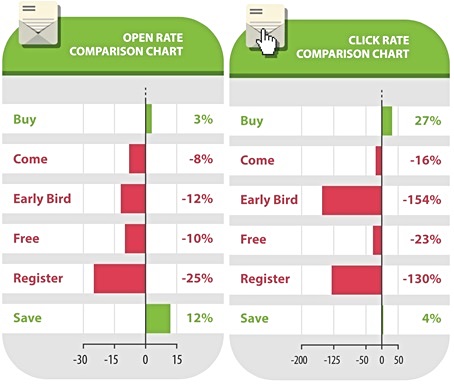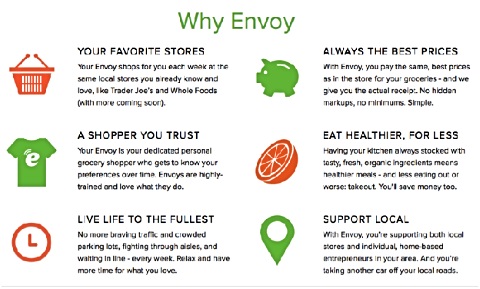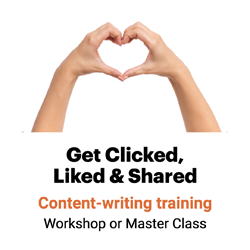Use imperative voice to focus on readers
They had me at “You’ll save 80 hours a year.”

Envoy, a grocery delivery company, does a great job of focusing on the benefits of its service:
You’ll save 80 hours a year.
Or more. It’s amazing how all those lost weekend afternoons and “oh no, I’m out of something” trips add up.
With Envoy, you’re on your way to a new world. Where you’ll have the freedom to get more done. To focus on what matters more. Or to simply relax and enjoy a well-deserved break.
But why “You’ll save 80 hours a year”? Why not just “Save 80 hours a year”?
That’s the imperative voice. And it’s a power tool of benefits writing.
Why choose the imperative voice?
We learned in third grade to call the imperative voice the command voice. And it can be a command: Do the dishes. Make your bed. Clean your room.

When communicators use it, though, think of it as the invitation voice: Save money, save time, avoid effort.
Why imperative?
1. Imperative voice gets shared.. Imperative words like see, make and look can help blog headlines go viral, according to a Rippen analysis of 3,016 headlines from Buzzfeed, ViralNova, Upworthy and Wimp.
2. Imperative voice boosts email click, open and read rates. Benefits verbs like add, open and try increase email reading, according to a study by Return Path, a global data and marketing firm. Return Path looked at more than 2 million email subscribers from 3,000 retail senders over a month last year.
Benefits verbs in subject lines increase email reading, says Return Path:
- Register: Average read rate is 24.19% (+6.70%)
- Open: Average read is 16.48% (+1.73%)
- Add: Average read rate is 16.56% (+1.13%)
- Add: Average read rate is 16.56% (+1.13%)
- Download: Average read rate is 25.03% (+0.3%)
- Try: Average read rate is 13.71% (+0.28%)
- Click: Average read rate is 12.27% (+0.20%)
A Phrasee study adds weight to this evidence: Experiential words like celebrate performed best in Phrasee’s analysis of more than 40 billion successful (and not so successful) emails to identify what works and what does not in subject lines.
Imperative voice works, according to Phrasee:
- Celebrate: Has a Phrasee score of 64 (open rate: 6.3%, click rate: -18.1%, CTO rate: -22.9%)
- Buy: Has a Phrasee score of 61 (open rate: 18.0%, click rate: -16.0%, CTO rate: -28.8%)
- Get your: Has a Phrasee score of 54 (open rate: 10.7%, click rate: 43.4%, CTO rate: 29.6%)
Adestra obtained similar results: Verbs like buy and save outperformed adjectives, including free, according to the U.K.-based email service provider’s analysis of more than 3 billion emails to learn which words work — and which don’t — in subject lines.*The Phrasee score is a normalized, weighted score that aggregates the overall effect a phrase has on response. The higher the Phrasee score, the more reliably positive the results are.

So the research is in: The imperative voice improves communication. So, what are best practices for the imperative voice?
1. Show them what they can do.
Instead of writing about us and our stuff, focus on what people can do with your stuff.

Need some inspiration?
Think imperative voice for email subject lines. Check out Unfunnel’s list of favorite benefits headlines, including:
- “Borrow” all my checklists …
- Check out new “man cave” [PICS]
- Discover The [desired result] Secret
- [Verb] Your Way To A [desired result]
- Stop [undesired result]
- Get [desired result] Without [undesired result]
- Get Rid of [problem] Once and For All
- Improve/Increase Your [desired result] In [time period]
Think imperative voice for headlines. One issue of New York magazine included all of these imperative headlines:
- Have a drink: 53 best bars to loosen up in this spring
- Own this city (department heading for a column about things to do this weekend)
- Eat Out (department heading for restaurant reviews)
- Drink up (department heading for bar reviews)
- Hire this … (department heading for profile of a job seeker)
- Score some swag (email contest promo)
- Get this (online promo)
Think imperative voice for news release leads. Steal a trick from this release lead from a Silver Anvil Award-winning PR campaign by Natural Resources Conservation Service:
Grab a spade … prepare your senses … dig a little … learn a lot. #LoveIt!
I also love this tagline from Truman State University:
Don’t follow. Pursue.
Think imperative voice for content promotion. “If a guy is walking into the street, you’re not going to shout out to him, ‘Hey, How Not to Get Hit by a Car.’ You’re going to say, ‘Hey, Look Out!’” David Zinczenko, editor of Men’s Health, told The New York Times. “The same thing applies to cover lines.”
Are you involving readers — or just preaching to them? Try inviting them into your content with the imperative voice.
2. Make lists parallel.
Back to Envoy for a minute. Here’s the list of benefits it shares on a web page:
- Your favorite stores
- A shopper you trust
- Live life to the fullest
- Always the best prices
- Eat healthier, for less
- Support local

So what’s wrong with this list?
Three of these things are not like the others. “Live life to the fullest,” “Eat healthier, for less” and “Support local” all use the imperative voice. The rest of the items on this list are not imperative. And that means this list is not parallel.
To fix that problem:
- Choose verbs. When you set up a benefits list, imagine a line that says, “That means you will …” You don’t need to write that line; just know that it’s there. That line will force you to use verbs, not nouns, for your list. That means you will … live life to its fullest; eat healthier, for less; support local.
- Make lists parallel. Now note which of these items doesn’t follow that line. That means you will … your favorite stores. That means you will … a shopper you can trust. That means you will … always the best prices.
- Fix your list. Now you can see what to do. Rewrite every “benefit” that’s really a feature (or a noun). Instead of “That means you will … always the best prices,” you’ll wind up with “That means you will … save with the best prices.”
Is your list parallel, benefits-focused and verb-based? Then press Send.
3. Write an invitation instead of a command.
Remember that Phrasee study that showed that experiential words like celebrate and love get top results in subject lines?

Guess what didn’t work? Command words, like spend, perform less effectively in subject lines. (Because who wants to spend?)
So make sure you’re writing an invitation instead of a command: Learn how to get twice the work done in half the time, not Register for our webinar.

Hi – I love this article, and the related one on fake benefits. In fact I used it to support my case when explaining the use of the imperative voice to a fellow copywriter. But I can never make sense of the numbers.You have ‘Love’ as -12.6 open rate, -26.3 click through and – 15.7 CTO (click to order?) – surely that means it’s depressing response? Can you explain? thanks, Chris
Thank you, Chris. Excellent question. We’re taking another look at the original research. Would you check back in a week or 10 days for an update?
Absolutely, thank you!